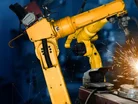Fero Labs CEO Berk Birand on technology, AI & sustainability

Berk Birand is the CEO of Fero Labs, an industrial process optimisation software company based in New York. He is passionate about helping large industrial companies advance their digital transformation goals using explainable machine learning.
He holds a Ph.D. in electrical engineering and computer science from Columbia University. His academic research focused on optimising wireless and optical networks with efficient cross-layer algorithms. He developed scheduling algorithms for optimising cellular base stations in 5G networks and has several patents in IoT systems for resilient fibre-optic networks.
Birland tells Manufacturing Global about the impact of software on labour shortages, the use of AI and sustainability goals.
Tell us about your work at Fero Labs
“At Fero Labs, our goal is to optimise factories with machine learning. Process engineers can minimise costs and maximise sustainability in real time using Fero’s machine learning-powered software suite, which includes analytics, simulations, recommendation capabilities and more.
“This proprietary technology was developed based on Bayesian machine learning research by co-founder Alp Kucukelbir, also Columbia Ph.D. and currently adjunct professor at Columbia.”
How is AI helping to meet sustainability goals for manufacturers?
“Traditionally, manufacturers have been reluctant to focus on sustainability as they believe it can impact short-term profits.
“Fero upends that thought process, as the software enables manufacturers to optimise for everything at the same time, including sustainability as well as costs, raw materials use, quality, throughput and all other top-line KPIs.
“Recently Fero was featured in a report by the Global Partnership on Artificial Intelligence as a case study of how manufacturing companies can use technology to improve their sustainability.”
Tell us about your partnerships?
“At Fero, partnering with similarly mission-driven companies is a core strategic decision. We have partnerships with both Microsoft and AWS, for both hosting our infrastructure and accelerating our go-to-market. We also have partnerships with solution providers in our sectors of focus.”
How does your software reduce the impact of labour shortages in technology and manufacturing?
“One crucial reason for the labour shortage is the lack of trained workers to fill specific mid-level operational roles. Traditionally, training and certification for a role like machinist or tool maker can take three to five years, dissuading many from pursuing these career paths. But with Fero, this training process can be shortened to a few months.
“Using a digital twin (a virtual copy of an industrial process), prospective operators can explore new scenarios and settings they might encounter on the factory floor. They can also experiment with hypothetical situations to test their decision-making prowess, without impacting production. This creates a new possibility for hiring. Rather than confining their search to operators who already have experience, manufacturers can hire less experienced individuals and bring them up to speed quickly and efficiently.
“In addition to operators, the manufacturing labour shortage includes data scientists. As manufacturers aim to realise the potential of Industry 4.0, it's crucial to have someone interpret all the data generated by factory sensors and translate it into actionable recommendations. That's where AI can play a huge role. Fero’s explainable machine learning software can ingest all the data generated on the factory floor and determine the optimal settings to make production more efficient in real time - essentially turning engineers and operators into data scientists.”
What are your personal and professional plans for 2022?
“2021 was a transformational year for us, both in terms of multiplying our go-to-market motion and growing our core team. Our main goal this year is to continue building up our core software offering and help more and more manufacturers, across several new sectors, to reduce costs and increase sustainability."
- Creating a 'Greener' Approach to Christmas Tree ProductionSustainability & ESG
- Carbmee: Helping Maersk & Coca-Cola Curtail Carbon EmissionsSustainability & ESG
- Verizon Business: Predictions for Manufacturing in 2025Digital Factory
- ABB & Microsoft Launch Generative AI Copilot for IndustryAI & Automation

